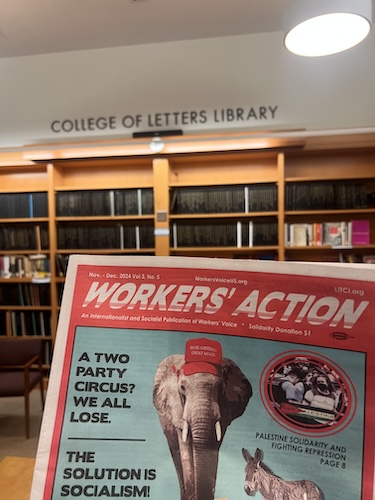
The Wesleyan Young Socialists hosted a meeting on Monday, Nov. 25 to discuss the future of organizing following the election of former president Donald Trump earlier this month. Around 15 students were in attendance at the meeting, which featured a talk by Hartford Public Schools teacher and Workers’ Voice member Sean Phillips. The meeting was held at the College of Letters Library in Boger Hall and lasted two hours.
Wesleyan Young Socialists was founded by University students this semester. The organization meets on Fridays from 1 p.m. to 3 p.m. in Boger Hall. According to Rosa ’25, a founder of the organization, the open meetings have each attracted around 30 people.
In the wake of the presidential election earlier this month, groups like Wesleyan Young Socialists have begun to discuss what the future of left-wing political organizing looks like on and off college campuses. Some in the organization have pointed to the Workers’ Voice to outline a strategy for left-wing activism.
Workers’ Voice is a self-described “revolutionary socialist organization” founded in 2022. The group aims to create a Marxist labor party in the United States to oppose the Democratic and Republican parties, seen as pro-capitalist institutions, as a path towards formulating a new socialist society.
“[Our] ultimate goal [is] building a party that is capable of mobilizing the working class to lead a revolution and take over state power,” a Workers’ Voice pamphlet distributed at the meeting read.
The event began at 5 p.m. with remarks by Phillips. He began by criticizing the Democratic Party for abandoning the working class and left-wing policies during their 2024 campaign.
“[The Democrats] will abandon any and all principles they feel it is necessary to in order to defend that system and their role in it—they are not part of any resistance, and they can’t be,” Phillips said. “They are part of the institutions which Trump is now the elected head of, and they will defer to him and prostrate in loyalty to the institutions, because what is most important to them is the continued smooth functioning of the capitalist state.”
Phillips also warned about the dangers of the incoming Trump administration.
“Such power in the hands of Donald Trump is a carte blanche for upending and crippling many of the community nonprofits which are likely to compose a part of efforts in defense of immigrants and others under attack by the new administration,” Phillips said. “Do we really think that Trump will not revoke the nonprofit status of immigrant defense organizations which attempt to organize resistance to his promised militarized roundup of immigrants for deportation? What about the nonprofits which provide much needed resources to our underserved schools? Will they lose their status for ‘supporting critical race theory’ or for ‘DEI practices?’”
Phillips invoked the history of revolutionary socialism in creating better conditions for working people as he exhorted attendees to take action.
“Our power is not individual or in small groups,” Phillips said. “Our power is in mass activity. A small group of activists blocking a plant gate will not stop production for long, but organizing the workers in that factory to go on strike or down tools in solidarity with community activists.”
After Phillips spoke, attendees joined in an open discussion about the future of socialist and labor activism under the Trump administration. Topics discussed included possible disruptions to the National Labor Relations Board under Trump, how the Democratic Party has lost working-class voters, and the history of revolutionary socialist action on university campuses.
Spencer Landers can be reached at sklanders@wesleyan.edu.
Miles Craven can be reached at mcraven@wesleyan.edu.



Leave a Reply